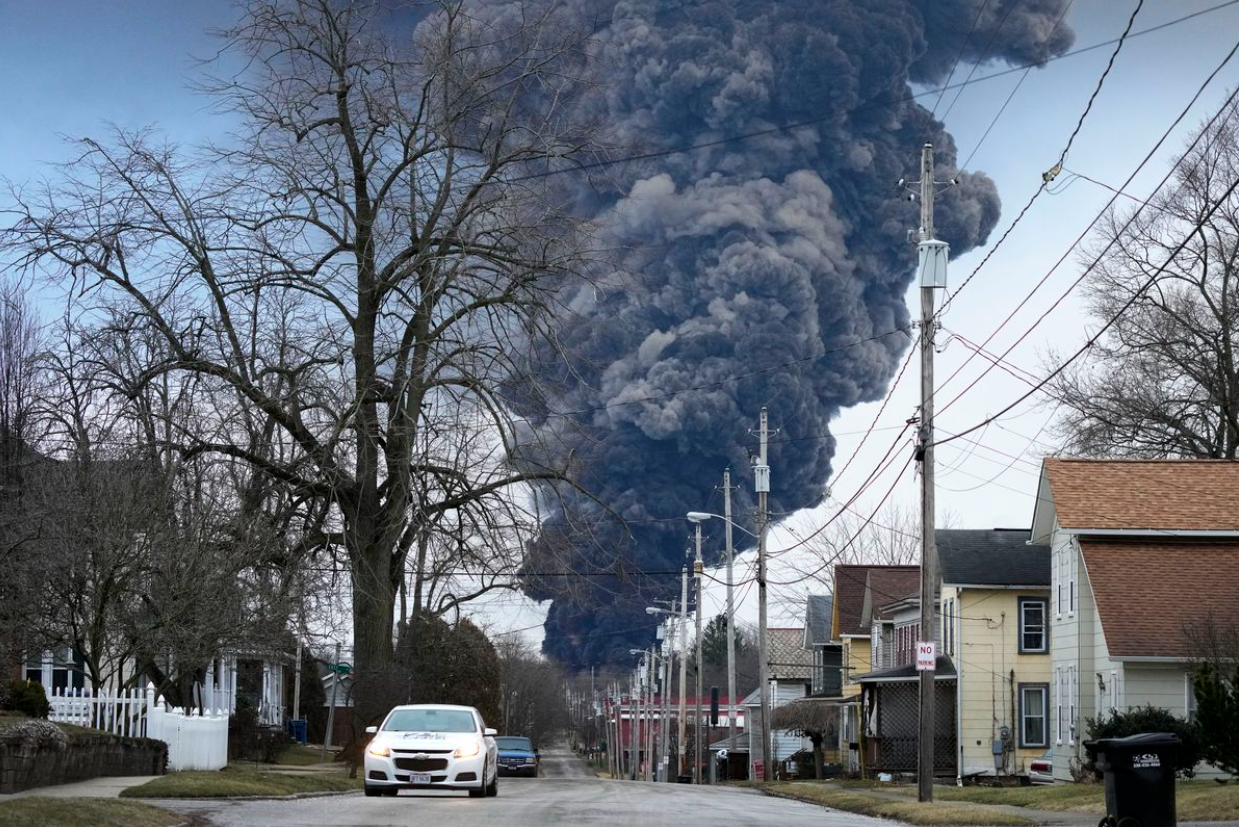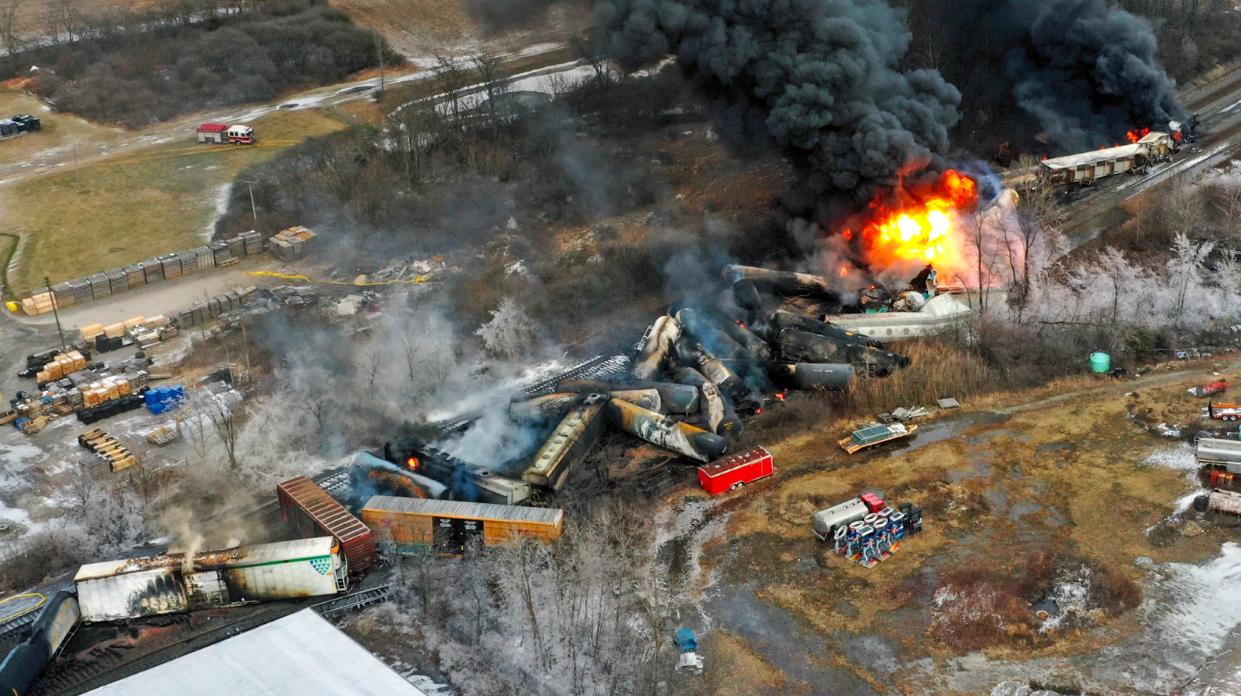Following the environmental disaster that occurred on Feb. 3 in East Palestine, Ohio, when a Norfolk Southern train crashed and caught fire, the roughly 4,700 residents of East Palestine and the surrounding area are still being affected by the derailment. The train had a total of 38 cars crash, with 11 of those tank cars “carrying hazardous materials that subsequently ignited, fueling fires,” the National Transportation Safety Board said in a preliminary report. Furthermore, “five of those derailed train cars were carrying 115,580 gallons of vinyl chloride.” Those five cars “continued to concern authorities because the temperature inside one tank car was still rising,” indicating a polymerization reaction that could result in an explosion, per the report. On Feb. 6, to help prevent a deadly explosion of vinyl chloride, crews released the toxic chemical into a trench and burned it off after the derailment, ultimately releasing the hazardous chemicals into the atmosphere.
Since Feb. 8, residents have been told by officials of the local government that their hometown is safe to return to, yet Courtney Newman, a mother and teacher in East Palestine, reported to CNN on Feb. 22 that “since her family returned home, her son has had bloody noses every day, and she has had skin issues.”
Another resident, Josh Hickman explained to CNN he “was among those who experienced headaches, dizziness and blood from his nose while in the village, and he went to the emergency room for treatment.” Other residents have reported eyes burning, headaches and vomiting since the derailment.
In addition to vinyl chloride—a carcinogen that is unsafe to touch, breath or drink as it can affect a person’s liver, lungs and nervous system—chemicals of concern at the site include phosgene and hydrogen chloride, a chemical heavier than oxygen that can sink and settle, which is released when vinyl chloride breaks down, according to the Environmental Protection Agency (EPA). All these chemicals can change when they break down or react with other things in the environment, creating a mixture of potential toxins.
The derailment caused the release of hazardous chemicals into the air and surface water, more recent air monitoring and water sample tests have shown no concerns with air quality or water quality in East Palestine’s municipal water supply, the EPA reported. The agency added that it would publish more detailed data “as it becomes available.”
Pictures and videos on social media have shown cups of water appearing murky, as well as oil bubbling up when one throws an object into a creek of water, causing residents to question whether the information being reported to them is entirely accurate.

Separately, there’s also a plume of butyl acrylate that leaked from the train floating down the Ohio River—a river that connects to every other major river system in America—although the Greater Cincinnati Water Works officials claim the chemicals that leaked into the river will likely have no impact on the drinking water for its 1.1 million customers. The testing that took place for water in approximately 75 homes did show elevated levels of volatile organic compounds, but further testing found that contaminants of concern from the derailment were not present in these homes, according to Ohio Gov. Mike DeWine
It’s not clear what effect the chemical spill will have on wildlife, though shortly after the wreck, The Ohio Department of Natural Resources reported the death of roughly 43,000 fish. Some environmental experts are also concerned that authorities may not be testing for the full range of compounds that could harm humans.
“It’s unclear what chemicals they’re testing for in comparison to what chemicals were generated and released,” environmental engineer at Purdue University Andrew Whelton told Vox News. It’s not just the chemicals that leaked from the train that are potentially hazardous, he said, but also compounds produced by combustion.
Since the derailment, President Biden told White House reporters on Feb. 24 that he currently has no plans to visit, but emphasized that he has been in close contact with elected officials in the region. Rather than make the trip himself, Biden has sent Transportation Secretary Pete Buttigieg and officials from the Federal Emergency Management Agency (FEMA) and the EPA in his stead. His statement came in the wake of withering criticism, especially from East Palestine Mayor Trent Conaway, in regards to Biden’s trip to Ukraine to meet with President Volodymyr Zelenskyy.
“The biggest slap in the face,” Conaway told Fox News. “That tells you right now, he doesn’t care about us,” Conaway added that he was “furious” the president was in Ukraine “giving millions of dollars away to people over there, not to us.”
So far, wastewater and soil that was contaminated in the derailment has been in the process of being transported to Texas and Michigan, where officials have said they were not given an adequate warning about the disposal of the toxic materials.
“I and my team learned yesterday that firefighting water from East Palestine was going to be sent to Deer Park, which is one of the 34 cities in Harris County, for disposal,” Harris County Judge Lina Hidalgo said at a press conference in Texas on Feb. 23. “I learned about this not from a regulatory agency, not from the company, but from a member of the press, and that’s unacceptable.”
Michigan Rep. Debbie Dingell similarly said in a statement that “we were not given a heads up” about the transportation of contaminated soil from East Palestine to the U.S. Ecology Wayne Disposal, Inc. in Belleville, Michigan.
“We are making inquiries of EPA, DOT, Norfolk Southern, U.S. Ecology, the state of Ohio and all others involved to understand what is being shipped, whether these are approved storage facilities, the implications of this decision, and how we ensure the safety of all Michigan residents,” Dingell continued.
Officials in Wayne County, where the U.S. Ecology facility is located, said they’re still not sure how the waste is being transported, according to ABC News affiliate WXYZ .
“1.8 million people are being sandbagged,” Wayne County Executive Warren Evans noted at a press conference on Feb. 24. “Vinyl chloride is a serious carcinogen and something we should have heard about sooner. The landfill taking the deep well injections is a facility cited many times and shut down in the past. Any of us that live and breathe are at risk.”

